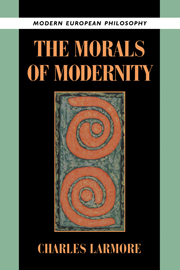Book contents
- Frontmatter
- Contents
- Acknowledgments
- Introduction
- I Modern Ethics
- II Beyond Naturalism
- III Liberalism and Modernity
- 6 Political Liberalism
- 7 Pluralism and Reasonable Disagreement
- 8 Carl Schmitt's Critique of Liberal Democracy
- 9 Modernity and the Disunity of Reason
- 10 The Foundations of Modern Democracy: Reflections on Jürgen Habermas
- Index
7 - Pluralism and Reasonable Disagreement
Published online by Cambridge University Press: 18 December 2009
- Frontmatter
- Contents
- Acknowledgments
- Introduction
- I Modern Ethics
- II Beyond Naturalism
- III Liberalism and Modernity
- 6 Political Liberalism
- 7 Pluralism and Reasonable Disagreement
- 8 Carl Schmitt's Critique of Liberal Democracy
- 9 Modernity and the Disunity of Reason
- 10 The Foundations of Modern Democracy: Reflections on Jürgen Habermas
- Index
Summary
Political Liberalism
Liberalism is a distinctively modern political conception. Only in modern times do we find, as the object of both systematic reflection and widespread allegiance and institutionalization, the idea that the fundamental principles of political association, being coercive, should be justifiable to all whom they are to bind. And so only here do we find the idea that these principles should rest, so far as possible, on a core, minimal morality that reasonable people can share, given their expectably divergent religious convictions and conceptions of the meaning of life. No longer does it seem evident – as it did, let us say, before the seventeenth century – that the aim of political association must be to bring man into harmony with God's purposes or to serve some comprehensive vision of the good life. The causes of this transformation are various, and not all of them lie at the level of moral principle. But a change in moral consciousness has certainly been one of the factors involved. As Hegel observed, modern culture is inherently a reflective one: notions of principle are essential to our selfunderstanding and thus to the stability of the social forms in which we participate. Modern culture has no room for a dichotomy between “in principle” and “in practice.” It is worth determining, then, what new moral conceptions have been responsible for the emergence of modern liberalism.
- Type
- Chapter
- Information
- The Morals of Modernity , pp. 152 - 174Publisher: Cambridge University PressPrint publication year: 1996
- 5
- Cited by



